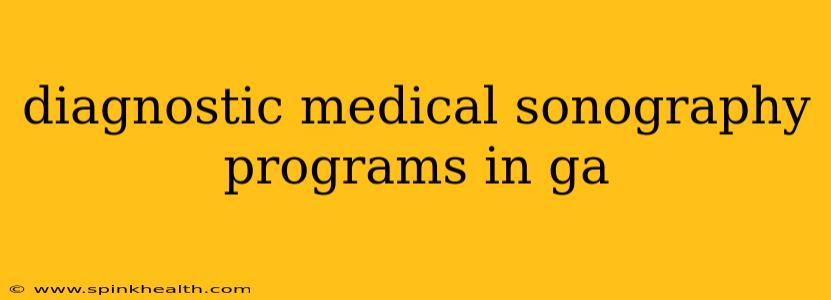Navigating the World of Diagnostic Medical Sonography Programs in Georgia: A Journey to a Rewarding Career
The rhythmic beep of the ultrasound machine, the grayscale image slowly revealing its secrets – this is the world of diagnostic medical sonography. If you're drawn to this fascinating field and are looking for diagnostic medical sonography programs in Georgia, you're in the right place. This isn't just about choosing a program; it's about embarking on a journey toward a fulfilling and impactful career. Let's explore the path together.
My name is Sarah, and I've spent years researching and working within the healthcare field, specifically focusing on allied health professions like sonography. I understand the challenges and rewards of this career path and am here to guide you through the process of finding the perfect program in Georgia.
What are the Different Types of Sonography Programs in Georgia?
Georgia offers a variety of sonography programs, catering to different learning styles and career aspirations. These programs typically lead to an Associate's Degree or a certificate. Some institutions offer specialized programs focusing on specific areas of sonography, like:
- Abdominal Sonography: Focusing on imaging the abdomen, including the liver, spleen, kidneys, and pancreas.
- Obstetric and Gynecological Sonography (OB/GYN): Specializing in imaging the female reproductive system during pregnancy and beyond.
- Cardiovascular Sonography: Focusing on the heart and blood vessels.
- Vascular Sonography: Specializing in imaging the blood vessels throughout the body.
- Neurosonography: Focusing on the brain and central nervous system.
- Musculoskeletal Sonography: Imaging muscles, tendons, ligaments, and joints.
Choosing a specialization depends on your interests and career goals. Some programs offer a general sonography curriculum, allowing for specialization later through further education or on-the-job experience.
How Long Do Diagnostic Medical Sonography Programs in GA Take?
The length of a diagnostic medical sonography program varies depending on whether you're pursuing an Associate's Degree or a certificate. Associate's degree programs usually take around two years to complete, while certificate programs can be shorter, often lasting one year or less. However, keep in mind that clinical rotations are a crucial part of these programs, extending the overall time commitment.
What is the Cost of Sonography Programs in Georgia?
The cost of sonography programs in Georgia can vary significantly depending on the institution, program length, and whether you are attending a public or private school. Tuition fees, books, and other program expenses should be carefully considered when planning your education. Many students explore financial aid options, including scholarships, grants, and student loans, to manage these costs.
What are the Accreditation Requirements for Sonography Schools in GA?
Accreditation is crucial. It ensures the program meets specific standards of education and prepares graduates for professional certification. Look for programs accredited by the Commission on Accreditation of Allied Health Education Programs (CAAHEP) or the American Medical Association's Committee on Allied Health Education and Accreditation (AMA-CAHEA). Accreditation significantly increases your chances of finding employment after graduation.
What is the Job Outlook for Sonographers in Georgia?
The job outlook for sonographers in Georgia, like many other parts of the country, is generally positive. The aging population and the increasing demand for non-invasive diagnostic imaging procedures contribute to this growth. However, the specific job market can vary across different regions within the state.
What Clinical Rotations are Included in a Georgia Sonography Program?
Clinical rotations are an integral part of a sonography program. These supervised experiences in healthcare settings provide hands-on training and allow students to apply what they've learned in the classroom. Specific clinical rotation sites and the length of each rotation will vary depending on the program.
What Certification is Needed After Graduation?
After graduating from an accredited sonography program, most sonographers pursue certification through organizations like the American Registry for Diagnostic Medical Sonography (ARDMS). Certification demonstrates competency and enhances employment opportunities.
Embarking on your journey toward becoming a diagnostic medical sonographer in Georgia is an exciting step. By carefully considering the various programs available, understanding the requirements, and planning for your future, you can confidently choose a path that will lead to a successful and rewarding career in this vital healthcare field. Remember to reach out to individual programs for the most up-to-date information on tuition, admissions requirements, and available specializations. Good luck!

